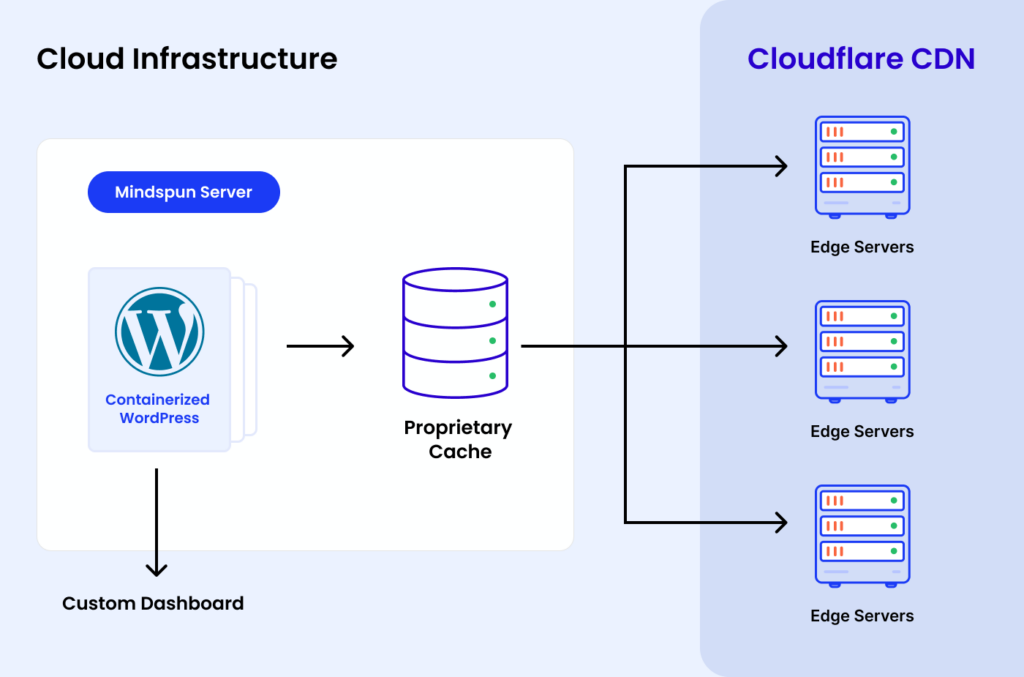Before sharing our definition we share the industry definition and explain what it’s not.
Cloud Computing, Cloud Servers, Cloud Storage, and Cloud Hosting – these terms surged in popularity after 2005 and have since become indispensable in various business applications. The advent of cloud technology ushered in a new era for the internet, transforming how we connect, share data, work, and host our websites.
Interestingly, different experts and companies offer distinct interpretations of what constitutes the Cloud, leaving no clear consensus on its precise definition. The answer, however, lies in the diverse use cases of the Cloud and how it is implemented, integrated, and set up.
Cloud Computing: A Definition
In its simplest form, the cloud refers to on-demand IT computing resources that can be accessed through the internet on a subscription basis, allowing you to pay only for what you use.
One of the key advantages of the cloud is that it frees you from the burden of maintaining hardware and software, saving both time and effort while providing enhanced speed and security.
Cloud hosting refers to the method of hosting websites, applications, and data on virtual servers. Cloud hosting providers manage these virtual servers and can be dynamically scaled to accommodate changing resource demands. Cloud hosting offers redundancy and high availability through the distribution of data across multiple servers and data centers.
Each hosting company defines WordPress Cloud Hosting in its own terms, typically incorporating specific features and services tailored to the WordPress hosting platform they provide.
What “WordPress Cloud Hosting” Is Not? Common Misunderstandings
1. It is not “Shared Hosting”; it is much more than that.
Shared Hosting is one of the earliest types of hosting services introduced. At its core, shared hosting refers to sharing a server with other applications or websites. With shared hosting, you lack transparency into the number of clients sharing the same server and the nature of those applications.
Shared hosting may seem economical, but it has several drawbacks, including sluggish load times, adverse effects on SEO rankings, frequent downtime, potential devaluation of server reputation due to one poorly performing website, increased vulnerability to security breaches, and the risk of data loss. Consequently, shared hosting is not widely favored in the web hosting community.
On the other hand, Cloud Hosting has experienced a surge in popularity; however, it is worth noting that Cloud Hosting can also be configured as shared hosting when multiple sites are hosted on the same server. This raises the question: What sets Shared Cloud Hosting apart from traditional Shared Hosting?
The answer is rather straightforward. Cloud hosting utilizes a distributed infrastructure across multiple virtual servers, each equipped with dedicated hardware resources. Suppose a cloud server has specifications such as 2 core processors with 4 GB of RAM. In that case, these hardware and/or virtual resources are exclusively allocated to the websites hosted on that cloud server.
Setting up Cloud as a shared hosting gives you better uptime, speed, security, flexibility, scalability, and more as compared to traditional shared hosting. The term ‘Scalable WordPress hosting’ has gained popularity, and as a result, some WordPress hosting companies now offer services marketed as ‘Scalable.’
2. Cloud hosting Isn’t limited to big brands like Google, Amazon, and Microsoft.
When we envision Cloud hosting, renowned brands like Google, Amazon Web Services, and Microsoft Azure often come to mind, leading us to assume that cloud hosting must be costly.
However, times have changed, and the reality is that numerous independent hosting brands now offer reliable Cloud hosting services with an outstanding reputation. The cost of hosting on the cloud has considerably decreased, enabling startups and individuals alike to easily host their websites in the cloud.
In fact, the popularity of WordPress Cloud hosting has reached such heights that a simple Google search yields numerous results showcasing a wide array of local and international hosting companies, along with premium hosting infrastructure like WP.cloud. The pricing options for hosting a single WordPress website range from less than a dollar up to thirty dollars.
3. Using a CDN makes it WordPress Cloud Hosting or not?
Content delivery networks (CDNs) are a prominent application of cloud computing. However, as we mentioned earlier, cloud computing encompasses a wide range of use cases, and a CDN is just one example. CDNs distribute static copies of your website across a global network of data centers so that users access your content from a server nearby, resulting in much faster page loading times.
Hence, one could argue that integrating a CDN on a WordPress website offers certain advantages of Cloud hosting. Nevertheless, WordPress cloud hosting extends beyond a CDN, emphasizing attributes such as scalability, flexibility, and the ability to store, process, and serve data through a robust cloud network.
As you delve deeper, you’ll discover that the term ‘WordPress Cloud Hosting’ encompasses various definitions across the web, one of which is Managed WordPress Hosting. While researching WordPress cloud hosting, you’ll commonly come across the following feature set:
- One-click WordPress installation on Cloud servers like Google, AWS, Azure, DigitalOcean, Vultr, and more
- Managed hardware and software
- Server stack optimization for WordPress websites
- Built-in caching solutions
- SSD/NVMe storage
- WordPress experts provide support
- Limitation to installing only WordPress, excluding other applications or CMS options
- Additional features such as CDN integration and caching plugins
However, what distinguishes one WordPress hosting provider from another?
- Varying server stacks, some offering NGINX while others provide Apache or LiteSpeed web servers.Different configuration of server operating system.
- Built-in security measures for WordPress websites at the server and website level.
- Diverse limits on storage, bandwidth, and the number of sites that can be hosted.
With the wide range of WordPress Cloud hosting solutions available, new users can find Cloud hosting’s intricacies quite confusing.
Mindspun’s interpretation of WordPress Cloud hosting
We at Mindspun aim to simplify WordPress adoption and enhance its growth as a user-friendly platform for establishing an online presence.
When we describe WordPress Cloud Hosting, we draw inspiration from Marc Benioff’s perspective on Cloud Hosting, where he states,
“The cloud services companies of all sizes; the cloud is for everyone. The cloud is a democracy.”
So, how does this apply to WordPress Cloud Hosting? Essentially, it means that computing resources should be readily accessible to all and must be user-friendly and easily understandable.
In our view, WordPress Cloud Hosting can be best defined as a high-availability network of interconnected servers optimized to deliver high performance, security, and redundancy specifically tailored for WordPress websites.
Cloud hosting is, by its own very nature, a complex affair. While it’s relatively easy to set up a simple hosting solution on a single VPS, for example, building and managing a Cloud is a much more complex and expensive engineering exercise. Fortunately, cloud hosting providers have built all kinds of management applications to make server management accessible. That said, you need to know what you’re doing.
The good news for the rest of us is that a whole category of Managed WordPress hosting providers have built tools that allow non-technical people to manage their hosting and application (WordPress) easily.
For instance, you can create staging sites, install SSL certificates, change PHP versions, and set up CDNs with just a click of a button.
Ultimately, it’s about what the customer needs. The cloud plays an important part but what it is and the semantics are not top of mind. We’ve asked Scot Rumery, Founder & President at Rumspeed, and he framed his answer around management:
“Managed WordPress Hosting is a service that is designed to provide a faster, more secure, and more optimized WordPress setup. Some tasks are handled for you, such as installing WordPress, automated backups, and WordPress core updates. This allows users to focus on what they do best, creating and publishing content that engages their audience.“
Introducing Mindspun Hosting – WordPress Cloud Hosting for All
Adhering to Marc Benioff’s inclusive vision, we are developing our own WordPress hosting platform that caters to everyone.
To ensure high availability, reliability, and scalability, we are building our infrastructure on Amazon Web Servers. Our pre-configured caching solutions further enhance the performance of your WordPress websites, providing you with optimal speed.
Here’s a simple representation of our hosting stack.

Two aspects are different from your standard hosting set up:
- We’re using Docker containers to ‘house’ WordPress
- We’ve built our own caching solution that can plug into the ‘edge’ – a CDN
Our emphasis extends beyond high performance and security. We also provide developers with robust tools to easily manage their websites through Mindspun’s platform. With features like SSH access and Git integration, you can seamlessly incorporate your development workflows within Mindspun’s ecosystem.
We are nearing the launch of our hosting platform and are dedicated to rapidly evolving it into a comprehensive solution designed to meet the needs of all types of WordPress websites. Our primary goals are to ensure scalability, flexibility, and control for our users.

 Mailing Address
Mailing Address